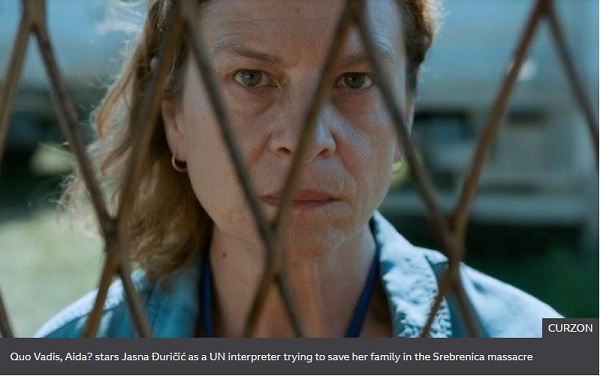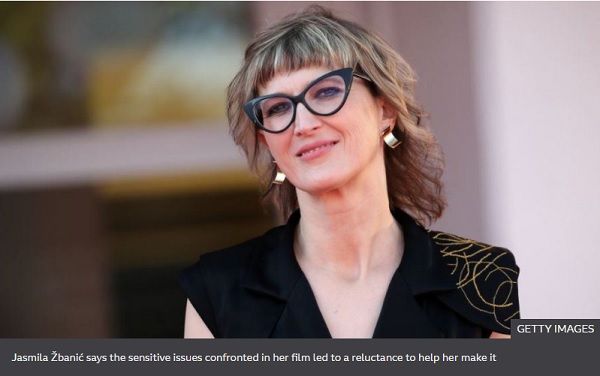
The inclusion of two female film-makers - Chloe Zhao and Emerald Fennell - in the nominations for best director at this year's Oscars has been hailed as historic. But two other women directors are also competing at the 2021 ceremony with their feature films.
Both The Man Who Sold His Skin, by Tunisian director Kaouther Ben Hania, and Bosnian director Jasmila Žbanić's Quo Vadis, Aida? are nominated for the best international film award.
And at the Baftas, Quo Vadis, Aida? is competing in the same category, while Žbanić is in the running for best director.
Quo Vadis, Aida? is the story of a fictional UN interpreter, played by Jasna Đuričić, and her battle to save her family in the massacre at Srebrenica, where 8,000 Muslim men and boys were killed in 1995 by Bosnian Serb forces. The film was funded by nine European countries, including Bosnia-Herzegovina.
"When we started on the film five years ago it looked like mission impossible," Žbanić explains.
"Bosnia doesn't have a film industry. We produce around one film a year, with a budget of around €1m (£850,000). But this film, partly because of the extras we needed, would cost at least four times that and so had to be a co-production with other countries.

"This is also a sensitive and painful topic, and as soon as we mentioned the word 'genocide', many people shied away, saying, 'It's too difficult.' Now I think, no, it's you who thinks an audience doesn't want to see difficult things.
"The awards nominations are such an incredible honour. A director always hopes their story will reach people's hearts in big numbers, and now we have the Bafta and Oscar nominations, I know how many more people will now see the movie."
One inspiration for the film was the book Under the UN Flag: The International Community and the Srebrenica Genocide by Hasan Nuhanović, but the director describes the main character of Aida as "a combination of many people we met or read about".
"Hasan was an interpreter who was there at Srebrenica and his family was expelled from the space," she explains. "So I did approach him, but it was hard for him to have a film based upon him, and also I wanted a woman as the main character, who wanted to protect her sons and her husband. In the development there were many women as inspiration whose sons were at Srebrenica."
Kaouther Ben Hania's film, The Man Who Sold His Skin, stars Yahya Mahayni as Sam, a Syrian refugee who agrees to make himself into a human canvas and be displayed around European galleries. Italian actress Monica Bellucci has a supporting role as a gallery owner.
The story is inspired by the real-life example of Tim Steiner, who agreed for his back to be tattooed by Belgian artist Wim Delvoye and then sold to a German art collector.
The director says she wants to show audiences how hard it is for a refugee to move around the world, compared with the movement of goods.

